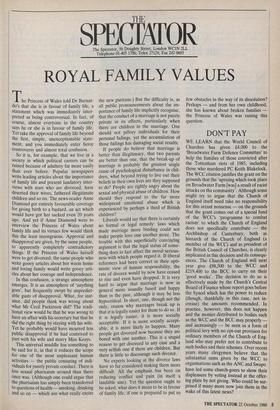SPECT THE AT OR
The Spectator, 56 Doughty Street, London WC1N 2LL Telephone 01-405 1706; Telex 27124; Fax 242 0603
ROYAL FAMILY VALUES
The Princess of Wales told Dr Barnar- do's that she is in favour of family life, a statement which was immediately inter- preted as being controversial. In fact, of course, almost everyone in the country says he or she is in favour of family life. Yet take the approval of family life beyond the first, simple, unexceptionable state- ment, and you immediately enter fierce controversy and almost total confusion.
So it is, for example, that we live in a society in which political careers can be ruined because of adultery far more easily than ever before. Popular newspapers write leading articles about the importance of family life and present laudatory inter- views with stars who are divorced, have deserted their wives, fathered illegitimate children and so on. The news-reader Anne Diamond got entirely favourable coverage for giving birth to a bastard, an act which would have got her sacked' even 20 years ago. And yet if Anne Diamond were to interview the Princess of Wales about family life and its virtues few would think this the least incongruous. Approval and disapproval are given, by the same people, to apparently completely contradictory things. If the Princess of Wales herself were to get divorced, the same people who write gooey articles about her warm home and loving family would write gooey arti- cles about her courage and independence.
In this confusion, a strange atmosphere emerges. It is an atmosphere of 'anything goes', but frequently swept by unpredict- able gusts of disapproval. What, for inst- ance, did people think was wrong about what Mr Cecil Parkinson did? The tradi- tional view would be that he was wrong to have an affair with his secretary but that he did the right thing by staying with his wife. Yet he probably would have incurred less public disapproval if he had contrived to part with his wife and marry Miss Keays. This universal muddle has something to be said for it, in that it reduces the scope for one of the most unpleasant human activities — the public censuring of indi- viduals for purely private conduct. There is less sexual pharisaism around than there once was. (Although one could argue that the pharisaism has simply been transferred to questions of health — smoking, drinking and so on — which are what really excite the new puritans.) But the difficulty is, as all public pronouncements about the im- portance of family life implicitly recognise, that the conduct of a marriage is not purely private in its effects, particularly when there are children in the marriage. One should not pillory individuals for their personal failings, yet the accumulation of those failings has damaging social results.
If people do believe that marriage is better than illegitimacy, that two parents are better than one, that the break-up of marriage is probably the greatest single cause of pyschological disturbance in chil- dren, what beyond trying to live out their beliefs in their own lives are they supposed to do? People are rightly angry about the sexual and physical abuse of children. How should they respond to the far more widespread emotional abuse which is experienced by perhaps a third of Bi-itish children?
Liberals would say that there is certainly no formal or legal remedy: laws which made marriage more binding could not make people love one another more. The trouble with this superficially convincing argument is that the legal status of some- thing does in fact affect the moral serious- ness with which people regard it. If liberal reformers had been correct in their opti- mistic view of human responsibility, the rate of divorce would by now have ceased to rise and even have dropped. It is very hard to argue that marriage is now in general more soundly based and happy than in the past, although it may be less hypocritical. In short, one, though not the only, reason why marriages break up is that it is legally easier for them to do so. If it is legally easier, it is more socially acceptable. If it is more socially accept- able, it is more likely to happen. Many people get divorced now because they are bored with one another. This is a stupid reason to get divorced in any case and a very selfish one if there are children. But there is little to discourage such divorce.
No experts looking at the divorce laws have so far considered making them more difficult. All the emphasis has been on reducing conflict and pain (in itself a laudable aim). Yet the question ought to be asked, what does it mean to be in favour of family life, if one is prepared to put so few obstacles in the way of its dissolution? Perhaps — and from her own childhood, she has known about broken families the Princess of Wales was raising this question.


































































 Previous page
Previous page